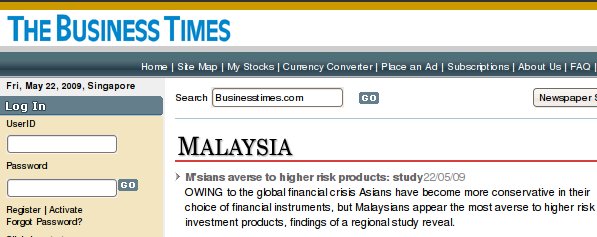
Here is an interesting story that appeared in today’s issue of The Business Times in Singapore. It’s saying that owing to the global financial crisis Malaysians appear to be the most averse among Asians to higher risk investment products. They have become more conservative in their choice of financial instruments.
According to the Life Outlook Index released by AXA, 67 percent of Malaysians indicated a preference for insurance products that offer protection as well as savings. It’s a ‘dramatic shift’ from aggressive to conservative strategies, and this is reflected in a big jump from 26 percent in 2007 to 45 percent of those planning to purchase life insurance.
The response rate for dual protection-savings products ranged between 40 and 60 percent for the other seven markets AXA had surveyed, namely, China, Hongkong, India, Indonesia, the Philippines, Singapore and Thailand.
AXA Affin Life Insurance chief marketing officer Nicholas Kua said the switch from high-risk, high-return investment products to options combining life protection and long-term savings was quite consistent with the firm’s observations. “The financial crisis has made Malaysians and Asians more conservative,” he said, which was surprising because unlike Hongkong and Singapore, Malaysian investors were spared much of the pain associated with structured products and investments tied to the now defunct Lehman Brothers.
Here’s the rest of the Business Time story:
Even so, Kua said it was evident Malaysians are shaken up by the global economic gloom and more willing now to plan for their retirement. Instead of starting at an average age of 37 as was the indication in 2007, they now plan to begin at 34 — earlier than the regional average of 36.
Nearly a quarter or 23 per cent plan to increase savings for retirement while 43 per cent would maintain the current pace.
But most are still far from ready for retirement with only 38 per cent having a plan (36 per cent previously). More than a quarter or 27 per cent are “thinking seriously” but unsure how to go about saving while 7 per cent are non-planners — admittedly an improvement from 12 per cent in 2007.
According to the Employees Provident Fund — the country’s biggest pension fund and main source of savings for most workers — the average savings for a 54 year old member last year amounted to RM132,500.
Given that 70 per cent of retirees who take out their EPF savings in a lump sum exhaust it within 3-10 years, the concerns and fear are very real.
Indeed the AXA survey showed only 29 per cent of Malaysians think they can maintain their health post-retirement, most believing their funds would be insufficient.
The respondents also desired to retire at an average age of 54 — one year before the retirement age — but believe 57 to be more likely given the current economic conditions.
Kua said unlike the Indians who are “very realistic” and willing to either work longer or compromise their present living standards to save for their retirement age, the survey revealed Malaysians want to enjoy their golden years but not at the expense of their luxuries.
One area they were willing to trade-off current living standards is to provide their children a better education (57 per cent).
Although only 57 per cent still see opportunities in the future compared to 64 per cent previously, 60 per cent still plan to have kids, with half of them planning to have at least three.
The survey covered 2,400 respondents regionally, those in Malaysia having an income of RM4,000 to RM5,000.
